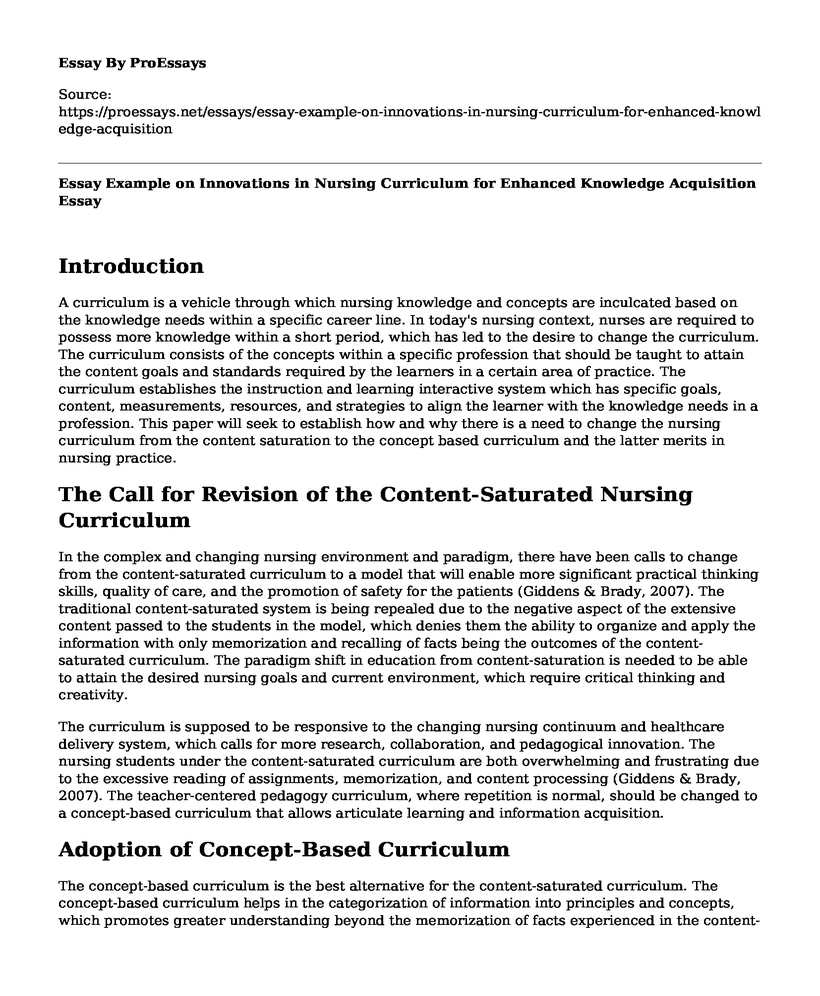Introduction
A curriculum is a vehicle through which nursing knowledge and concepts are inculcated based on the knowledge needs within a specific career line. In today's nursing context, nurses are required to possess more knowledge within a short period, which has led to the desire to change the curriculum. The curriculum consists of the concepts within a specific profession that should be taught to attain the content goals and standards required by the learners in a certain area of practice. The curriculum establishes the instruction and learning interactive system which has specific goals, content, measurements, resources, and strategies to align the learner with the knowledge needs in a profession. This paper will seek to establish how and why there is a need to change the nursing curriculum from the content saturation to the concept based curriculum and the latter merits in nursing practice.
The Call for Revision of the Content-Saturated Nursing Curriculum
In the complex and changing nursing environment and paradigm, there have been calls to change from the content-saturated curriculum to a model that will enable more significant practical thinking skills, quality of care, and the promotion of safety for the patients (Giddens & Brady, 2007). The traditional content-saturated system is being repealed due to the negative aspect of the extensive content passed to the students in the model, which denies them the ability to organize and apply the information with only memorization and recalling of facts being the outcomes of the content-saturated curriculum. The paradigm shift in education from content-saturation is needed to be able to attain the desired nursing goals and current environment, which require critical thinking and creativity.
The curriculum is supposed to be responsive to the changing nursing continuum and healthcare delivery system, which calls for more research, collaboration, and pedagogical innovation. The nursing students under the content-saturated curriculum are both overwhelming and frustrating due to the excessive reading of assignments, memorization, and content processing (Giddens & Brady, 2007). The teacher-centered pedagogy curriculum, where repetition is normal, should be changed to a concept-based curriculum that allows articulate learning and information acquisition.
Adoption of Concept-Based Curriculum
The concept-based curriculum is the best alternative for the content-saturated curriculum. The concept-based curriculum helps in the categorization of information into principles and concepts, which promotes greater understanding beyond the memorization of facts experienced in the content-saturated model. The concept-based curriculum design facilitates the learner to acquire and understand the knowledge, and concepts relationships and patterns, which is instrumental in promoting critical thinking to address the patient's needs in contemporary times (Hendricks & Wangerin, 2017). Focusing on the key concepts helps to create student-centered classrooms and engaging practical activities, which allows the students to acquire nursing concepts and process competencies. Active learning that occurs in the classroom increases the overall learning outcomes, which instrumental in understanding different situations and encourages problem-solving and critical thinking approaches to nursing (Hendricks & Wangerin, 2017).
The Description of the New Nurse
The 21st century operates in a complex operating environment due to high care and patient safety expectations. The 21st-century nurse should be a critical thinker with a broad range of competencies in multiple nursing areas while possessing the capability to be able to integrate information to solve complex care situations (Crawford, Omery, & Spicer, 2017). The 21st-century nurse has access to a wide array of data with the primary focus on health changing from prevention and monitoring to primary care where the patient's health needs are more complex and accustomed to the patient's needs. Nursing today is viewed as partners by the physicians being a critical element in delivering patient-centered care.
Conclusion
In conclusion, the changes in nursing roles and education needs are the primary cause of the changing of the nursing curriculum from a content-saturated curriculum to the concept-based curriculum. The latter equips nurses with specific skills and concepts that can improve their ability to offer patient-centered care and to make them critical thinkers attributes necessary for the 21st-century nurses.
References
Crawford, C. L., Omery, A., & Spicer, J. (2017). An integrative review of 21st-century roles, responsibilities, characteristics, and competencies of chief nurse executives. Nursing administration quarterly, 41(4), 297-309. Retrieved from https://www.ingentaconnect.com/content/wk/naq/2017/00000041/00000004/art00006
Giddens, J. F., & Brady, D. P. (2007). Rescuing nursing education from content saturation: The case for a concept-based curriculum. Journal of Nursing Education, 46(2), 65-69. Retrieved from https://www.healio.com/journals/jne/2007-2-46-2/%7Bd8b6c675-2d30-4c56-9363-010079cd31a0%7D/rescuing-nursing-education-from-content-saturation-the-case-for-a-concept-based-curriculum
Hendricks, S. M., & Wangerin, V. (2017). Concept-based curriculum: changing attitudes and overcoming barriers. Nurse educator, 42(3), 138-142. Retrieved from https://journals.lww.com/rca/00006223-201705000-00010.fulltext
Cite this page
Essay Example on Innovations in Nursing Curriculum for Enhanced Knowledge Acquisition. (2023, Mar 26). Retrieved from https://proessays.net/essays/essay-example-on-innovations-in-nursing-curriculum-for-enhanced-knowledge-acquisition
If you are the original author of this essay and no longer wish to have it published on the ProEssays website, please click below to request its removal:
- Essay on Nursing: Registered Nurse Licensed Practical and Licensed Vocational Nurses
- Essay Sample on Angiotensin-Converting-Enzyme Inhibitor
- Essay Sample on Hospital Versus Home Births
- Essay Sample on Nursing: Caring for the Sick, Dying, and Disabled
- Essay on Domestic Violence and Women With Learning Disabilities: An In-Depth Exploration
- Woodland Heights Medical Center: Low Vaccination Rates Among Health Care Workers - Essay Sample
- Comparing Virtual Sim to F2F Interactions: My Experience as a Nursing Student - Essay Sample







